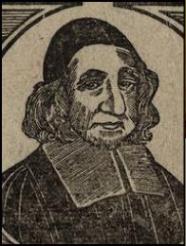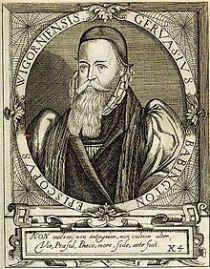In my final post for 2013, I turn to the first half of the 2nd century AD, to Aristides of Athens, a Greek Christian author, who wrote an Apology to the Roman emperor Hadrian, in order to counter the popular notion that Christians were nothing but a sect of erring troublemakers, and the persecution that came with it.
Aristides starts his apology in chapter 1 by stating some of the attributes of the true God. He then says in chapter 2 that there are “four classes of men in this world: Barbarians and Greeks, Jews and Christians”, and goes on to describe the religious practices of each of these “classes”, pointing out the errors of the first three classes and attempting to make a positive case for Christians.
First, of the Barbarians (chapters 3-7) he states that they worship dead warriors and the elements of the Earth, which he claims are the works of God, therefore they do not know who the true God is (i.e. they worship creature rather than Creator).
The Greeks (chapters 8-13) are next because: “they are more subtle than the Barbarians, have gone further astray than the Barbarians; inasmuch as they have introduced many fictitious gods, and have set up some of them as males and some as females; and in that some of their gods were found who were adulterers, and did murder, and were deluded, and envious, and wrathful and passionate, and parricides, and thieves, and robbers.” In other words, Aristides is calling the Greek gods corrupt, immoral and guilty of being human. He concludes his chapters on the Greeks by commenting on the religious beliefs of the Egyptians, who he claims are the most ignorant people on earth since they did not accept the beliefs of the Greeks or Chaldeans and instead worshipped gods modeled after plants and animals.
The Jews (chapter 14) are only commented on in a concise manner. Aristides commends them for their worship of God as the Creator and almighty but claims they have “erred from true knowledge” because “in their imagination they conceive that it is God they serve; whereas by their mode of observance it is to the angels and not to God that their service is rendered:— as when they celebrate sabbaths and the beginning of the months, and feasts of unleavened bread, and a great fast; and fasting and circumcision and the purification of meats, which things, however, they do not observe perfectly.”
In chapters 15 and 16 (given below in full), Aristides then sets forth his description of and apology for the Christians:
“15. But the Christians, O King, while they went about and made search, have found the truth; and as we learned from their writings, they have come nearer to truth and genuine knowledge than the rest of the nations. For they know and trust in God, the Creator of heaven and of earth, in whom and from whom are all things, to whom there is no other god as companion, from whom they received commandments which they engraved upon their minds and observe in hope and expectation of the world which is to come. Wherefore they do not commit adultery nor fornication, nor bear false witness, nor embezzle what is held in pledge, nor covet what is not theirs. They honour father and mother, and show kindness to those near to them; and whenever they are judges, they judge uprightly. They do not worship idols (made) in the image of man; and whatsoever they would not that others should do unto them, they do not to others; and of the food which is consecrated to idols they do not eat, for they are pure. And their oppressors they appease [literally: comfort] and make them their friends; they do good to their enemies; and their women, O King, are pure as virgins, and their daughters are modest; and their men keep themselves from every unlawful union and from all uncleanness, in the hope of a recompense to come in the other world. Further, if one or other of them have bondmen and bondwomen or children, through love towards them they persuade them to become Christians, and when they have done so, they call them brethren without distinction. They do not worship strange gods, and they go their way in all modesty and cheerfulness. Falsehood is not found among them; and they love one another, and from widows they do not turn away their esteem; and they deliver the orphan from him who treats him harshly. And he, who has, gives to him who has not, without boasting. And when they see a stranger, they take him in to their homes and rejoice over him as a very brother; for they do not call them brethren after the flesh, but brethren after the spirit and in God. And whenever one of their poor passes from the world, each one of them according to his ability gives heed to him and carefully sees to his burial. And if they hear that one of their number is imprisoned or afflicted on account of the name of their Messiah, all of them anxiously minister to his necessity, and if it is possible to redeem him they set him free. And if there is among them any that is poor and needy, and if they have no spare food, they fast two or three days in order to supply to the needy their lack of food. They observe the precepts of their Messiah with much care, living justly and soberly as the Lord their God commanded them. Every morning and every hour they give thanks and praise to God for His loving-kindnesses toward them; and for their food and their drink they offer thanksgiving to Him. And if any righteous man among them passes from the world, they rejoice and offer thanks to God; and they escort his body as if he were setting out from one place to another near. And when a child has been born to one of them, they give thanks to God; and if moreover it happen to die in childhood, they give thanks to God the more, as for one who has passed through the world without sins. And further if they see that anyone of them dies in his ungodliness or in his sins, for him they grieve bitterly, and sorrow as for one who goes to meet his doom.
16. Such, O King, is the commandment of the law of the Christians, and such is their manner of life. As men who know God, they ask from Him petitions which are fitting for Him to grant and for them to receive. And thus they employ their whole lifetime. And since they know the loving-kindnesses of God toward them, behold! For their sake the glorious things which are in the world flow forth to view. And verily, they are those who found the truth when they went about and made search for it; and from what we considered, we learned that they alone come near to a knowledge of the truth. And they do not proclaim in the ears of the multitude the kind deeds they do, but are careful that no one should notice them; and they conceal their giving just as he who finds a treasure and conceals it. And they strive to be righteous as those who expect to behold their Messiah, and to receive from Him with great glory the promises made concerning them. And as for their words and their precepts, O King, and their glorying in their worship, and the hope of earning according to the work of each one of them their recompense which they look for in another world, you may learn about these from their writings. It is enough for us to have shortly informed your Majesty concerning the conduct and the truth of the Christians. For great indeed, and wonderful is their doctrine to him who will search into it and reflect upon it. And verily, this is a new people, and there is something divine [literally: a divine admixture] in the midst of them.
Take, then, their writings, and read therein, and lo! You will find that I have not put forth these things on my own authority, nor spoken thus as their advocate; but since I read in their writings I was fully assured of these things as also of things which are to come. And for this reason I was constrained to declare the truth to such as care for it and seek the world to come. And to me there is no doubt but that the earth abides through the supplication of the Christians. But the rest of the nations err and cause error in wallowing before the elements of the world, since beyond these their mental vision will not pass. And they search about as if in darkness because they will not recognize the truth; and like drunken men they reel and jostle one another and fall.”
Aristides concludes his Apology in chapter 17 by requesting the emperor stop persecuting the Christians and convert to their faith; where he ends with a description of the Christian life:
“17. Thus far, O King, I have spoken; for concerning that which remains, as is said above, there are found in their other writings things which are hard to utter and difficult for one to narrate,— which are not only spoken in words but also wrought out in deeds.
Now the Greeks, O King, as they follow base practises in intercourse with males, and a mother and a sister and a daughter, impute their monstrous impurity in turn to the Christians. But the Christians are just and good, and the truth is set before their eyes, and their spirit is long-suffering; and, therefore, though they know the error of these (the Greeks), and are persecuted by them, they bear and endure it; and for the most part they have compassion on them, as men who are destitute of knowledge. And on their side, they offer prayer that these may repent of their error; and when it happens that one of them has repented, he is ashamed before the Christians of the works which were done by him; and he makes confession to God, saying, I did these things in ignorance. And he purifies his heart, and his sins are forgiven him, because he committed them in ignorance in the former time, when he used to blaspheme and speak evil of the true knowledge of the Christians. And assuredly the race of the Christians is more blessed than all the men who are upon the face of the earth.
Henceforth let the tongues of those who utter vanity and harass the Christians be silent; and hereafter let them speak the truth. For it is of serious consequence to them that they should worship the true God rather than worship a senseless sound. And verily whatever is spoken in the mouth of the Christians is of God; and their doctrine is the gateway of light. Wherefore let all who are without the knowledge of God draw near thereto; and they will receive incorruptible words, which are from all time and from eternity. So shall they appear before the awful judgment which through Jesus the Messiah is destined to come upon the whole human race.”










